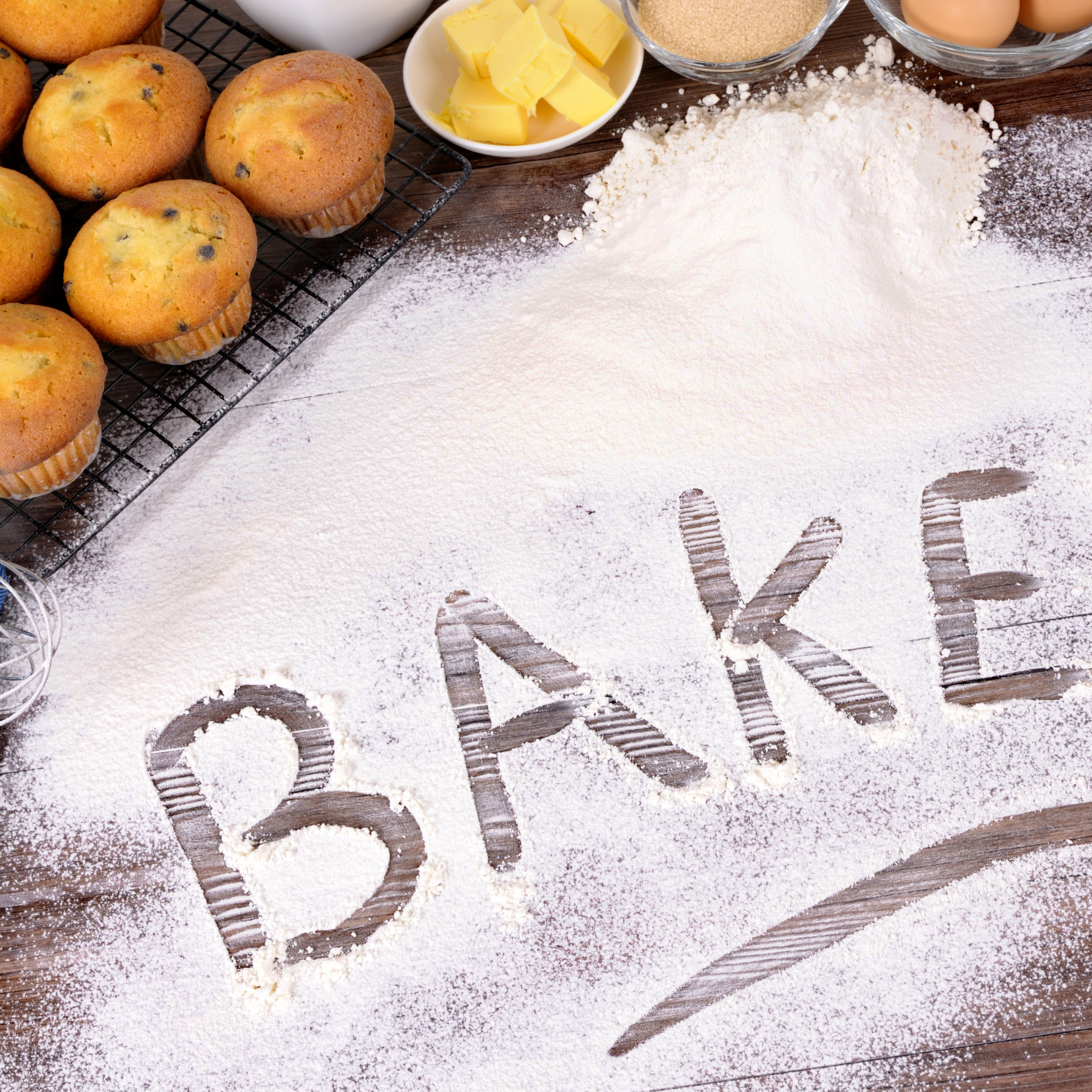
Baking with Monk Fruit Blends: Tips and Tricks
Monk Fruit can be a great addition to baked goods. When we say 'can be', we mean there are important things to keep in mind before modifying your recipes and swapping out sugar for monk fruit.
The first important thing to note is that most commercial monk fruit is actually monk fruit that is blended with erythritol, like our products MonkVee Golden Monk Fruit and MonkVee Original Monk Fruit. This is what you want when baking.
In baking, do not use monk fruit in the concentrated extract form, like MonkVee Pure Monk Fruit Extract on its own. While the extract is excellent for sweetening, it will likely flop used in your baked cakes, cookies, and muffins. The reason for this is that sugar not only sweetens baked goods, but it also contributes to the bulk and texture of baked good. For more information on that, see our previous post here.
Monk fruit mixed with erythritol can mimic the properties of sugar in baking, but too much erythritol in a recipe can have a sort of cooling effect or an extra 'crunch' that bakers often want to avoid. Here are some considerations to keep in mind:
- Add monk fruit blend to the wet ingredients: Following this rule will allow the erythritol in the blend to dissolve adequately, giving the best texture to baked goods.
- Use room temperature ingredients: Before beginning your recipe, make sure your ingredients have sufficiently cooled down, like your eggs, butter, or milk. Without this step, the monk fruit blend may not dissolve sufficiently.
- Add a little moisture: Monk fruit sweetener can sometimes cause baked goods to become dry or crumbly. To help prevent this, you can try adding a little extra moisture to your recipes, such as a small amount of additional oil or butter or an egg.
- Make powdered monk fruit blends: Placing a cup or more of a monk fruit blend in a high-speed food processor will give you a powdered version of the sweetener. Blend it for a minute or so to produce a powdered product that dissolves easily when added to recipes. This tip is an important one for recipes that do not call for any liquid ingredients.
- Experiment with different forms: When developing recipes at MonkVee, we have found it helpful to cut back on the amount of monk fruit blend in a recipe by 25-35% to reduce any sort of cooling effect. To make up for the remaining sweetness, we use an extract form of either monk fruit or stevia. This combination of sweeteners works because the baking blend still provides the bulk and texture, and the extract provides the missing sweetness. This tip will take some experimenting to find the sweet spot. Start by reducing the monk fruit blend by 25% and adding a scoop or two of the extract until you achieve the desired sweetness.
If you are looking for high-quality monk fruit sweetener and stevia products, be sure to check out all of our products. Monkvee Natural is a trusted source for dietitian-approved stevia and monk fruit products at a great price.
With a little practice and these tips and tricks, you can create delicious and healthy baked goods using monk fruit sweetener. Happy baking!




MonkVee
Monk Fruit Extract - 100% Pure & Natural, No Fillers




MonkVee
Stevia Extract - 100% Pure, Naturally Extracted Reb A Leaf




MonkVee
Monk Fruit Sugar - Golden, 100% Natural Sugar Replacement | MonkVee




MonkVee
Monk Fruit Sweetener - Original, Natural Sugar Substitute | MonkVee
Calorie Calculator

Build Your MonkVee® Box
Ditch the sugar & lab made sweeteners for good!
Glycemic Index Calculator
Click product for details and to upgrade to Subscribe & Save
Try MonkVee®
Mac: Command + F to find your question
Commonly Asked Questions
Why use Monk Fruit Sweetener?
MonkVee® Monk Fruit Sweeteners are 100% natural and zero calories. Unlike sugar which is known to be the leading cause of dozens of awful chronic illnesses such as certain cancers, diabetes, and other killers. MonkVee® Monk Fruit (and Stevia extract) are the healthiest known sweeteners available on the market today. Unlike lab-made artificial sweeteners, MonkVee® is your #1 choice for pure, natural, delicious sweetness. No More sugar spikes and sugar crashes, jitters, diseases, tooth decay and cavities... The list goes on. Try MonkVee® and enter the sweet life!
Will monk fruit sweetener activate yeast
Monk fruit doesn't activate yeast like sugar does, however, by using MonkVee® Monk Fruit, you can reduce the sugar in your recipe overall and have a much healthier outcome! And it will taste just as good! See our full article about baking with monk fruit here.
What is monk fruit?
Monk fruit, also known as luo han guo, is a small green melon native to Southeast Asia. It's valued for its sweetness and health benefits.
How is monk fruit sweetener made?
Monk fruit sweetener is made by extracting the natural sugars from the monk fruit, resulting in a concentrated sweetener that is much sweeter than sugar.
Is monk fruit sweetener a good sugar alternative for baking?
Yes, monk fruit sweetener can be used as a sugar alternative in baking. It provides sweetness without the calories or blood sugar spikes associated with regular sugar.
Does monk fruit sweetener have any calories?
Monk fruit sweetener is calorie-free, making it an excellent option for those watching their calorie intake.
Can monk fruit sweetener be used by people with diabetes?
Yes, monk fruit sweetener is a suitable option for people with diabetes because it does not affect blood sugar levels.
Is monk fruit sweetener safe for weight loss diets?
Monk fruit sweetener can be a helpful tool for those on weight loss diets as it provides sweetness without the calories of sugar.
Does monk fruit sweetener have an aftertaste?
Monk fruit sweetener typically does not have an aftertaste, especially when compared to other artificial sweeteners.
Can monk fruit sweetener help with acne?
While there's no direct evidence linking monk fruit sweetener to acne, reducing sugar intake, including monk fruit sweetener, may contribute to clearer skin for some individuals.
Does monk fruit sweetener affect sleep quality?
Monk fruit sweetener does not directly affect sleep quality. However, consuming it in excess before bedtime may lead to digestive discomfort, which could impact sleep.
Are there any known side effects of consuming monk fruit sweetener?
Monk fruit sweetener is generally recognized as safe (GRAS) according to the FDA.
Can monk fruit sweetener be used in hot beverages like coffee or tea?
Yes, monk fruit sweetener can be added to hot beverages like coffee or tea to sweeten them without adding calories.
Is monk fruit sweetener suitable for vegan diets?
Yes, monk fruit sweetener is vegan-friendly as it is derived from the fruit and does not contain any animal products.
How does monk fruit sweetener compare to other natural sweeteners like stevia?
Monk fruit sweetener and stevia are both natural sweeteners with zero calories, but monk fruit is often considered to have a cleaner, more sugar-like taste.
Can monk fruit sweetener be used in cold beverages?
Yes, monk fruit sweetener can be used to sweeten cold beverages like iced tea or lemonade without any issues.
Does monk fruit sweetener contain any artificial ingredients?
No, monk fruit sweetener is made from the natural sugars found in the monk fruit and does not contain any artificial ingredients.
Can monk fruit sweetener be used in recipes that require caramelization?
Monk fruit sweetener can be used in recipes that require caramelization, but it may not caramelize in the same way that sugar does.
Can monk fruit sweetener be used in homemade jams and preserves?
Yes, monk fruit sweetener can be used to sweeten homemade jams and preserves instead of sugar. It will provide sweetness without adding extra calories.
Does monk fruit sweetener have a glycemic index?
Monk fruit sweetener has a glycemic index of zero, meaning it does not raise blood sugar levels.
Can monk fruit sweetener be used in raw desserts?
Yes, monk fruit sweetener can be used in raw desserts to add sweetness without the need for cooking or baking.
Is monk fruit sweetener suitable for people with gluten intolerance?
Yes, monk fruit sweetener is gluten-free and can be safely consumed by people with gluten intolerance or celiac disease.
Can monk fruit sweetener be used in homemade salad dressings?
Yes, monk fruit sweetener can be used to sweeten homemade salad
Is monk fruit sweetener suitable for people following a ketogenic diet?
Yes, monk fruit sweetener is suitable for those on a ketogenic diet as it does not contain any carbohydrates or sugars that could affect ketosis.
Can monk fruit sweetener be used in beverages other than tea and coffee?
Absolutely! Monk fruit sweetener can be used in various beverages like smoothies, cocktails, and flavored water to add sweetness without the extra calories.
Does monk fruit sweetener affect blood sugar levels?
No, monk fruit sweetener does not affect blood sugar levels as it has a glycemic index of zero. It's a suitable option for those monitoring their blood sugar.
Is monk fruit sweetener safe for pregnant women?
Monk fruit sweetener is generally considered safe for pregnant women, but it's always best to consult with a healthcare professional for personalized advice.
Can monk fruit sweetener be used in homemade granola bars?
Yes, monk fruit sweetener can be used in homemade granola bars to provide sweetness without the added sugar. It's a healthier option for snacks.























